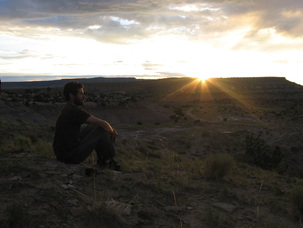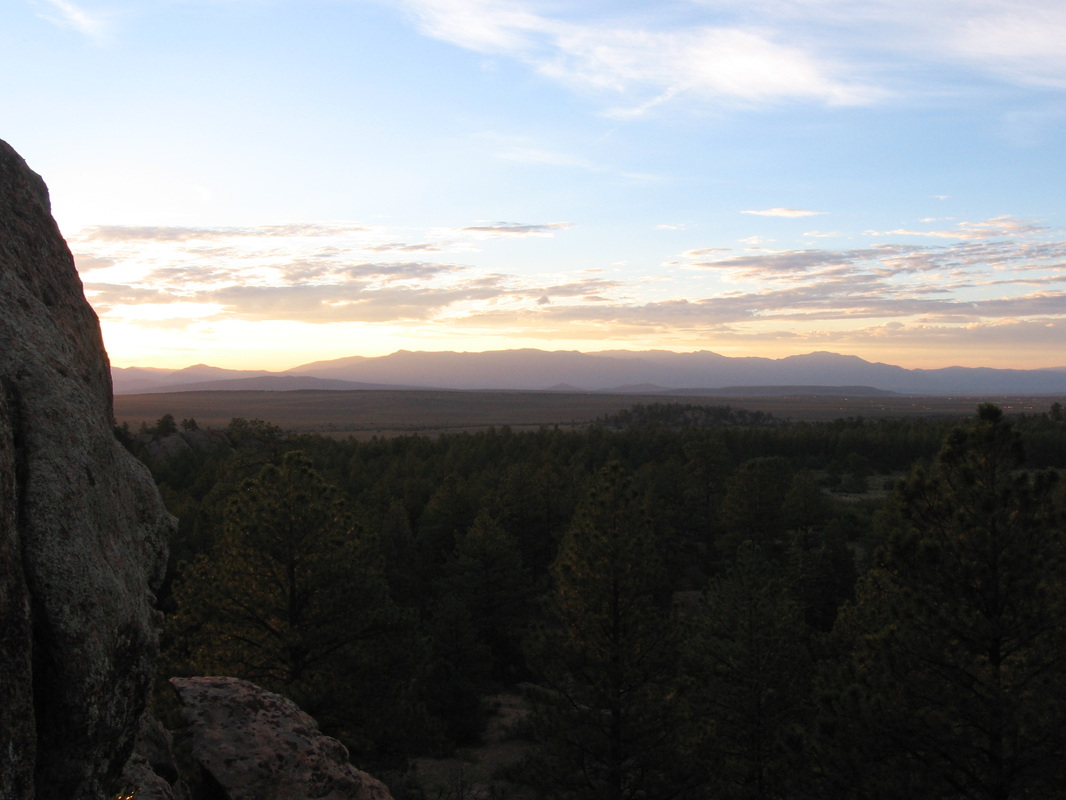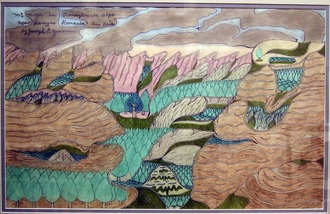|
I was speaking with a British historian friend the other night about the American drive to individual freedom and autonomy, the transcendentalist ideal that separates us from many other cultures. It goes without saying that this trait of ours is not without drawbacks. We are impelled to sacrifice the collective, the group culture, our connection to our homes, our elders, our geographical and personal ancestry.
Art and music give us transcendent experience. As Americans it is perhaps our tragic flaw that we insist on conceptually placing this experience outside of ourselves. Perhaps unnecessarily, we take the Promethean weight solely upon our own shoulders. It would be better to share it. It's actually easy to cast aside what you've known in search of new and deeper experience. Taking that new knowledge home with you, sharing it with the others in your life, letting it transform your daily existence from within without destroying anything without -- this is the part that takes courage. Five Drawings by Joseph E Yoakum is coming. Lots of music. I embarked on this project last October and all the parts are in place -- just brushing off some dust here and there. It has occurred to me many times, in various guises, that there is something continuous underlying my childhood love of The Mysteries of Harris Burdick, my teenage love of Mulholland Drive, my more-recent infatuation with Last Year at Marienbad, my preference of Miles Smiles within the vast catalog of Miles Davis, my abiding fascination with Nabokov's Pale Fire, my glee at encountering The Wind-Up Bird Chronicle, &c. I have a taste for enigmas, for ineffable riddles, for red herrings and trap doors. It is this side of my personality, primarily, that I satisfy with the Yoakum music. My affinity for the surreal and inexplicable has led to some of my most unique compositions, which have also typically been those to provoke the strongest reactions--viz., enthusiasm from my friends, skepticism from my teachers, and censure from most of the famous/prominent composers upon whose ears they happened to alight. I take the fault, of course, for failing in many instances to convey my intentions as clearly as possible. Clarity can perhaps be a means by which the end of deeper ambiguity can be reached. That said, the idea that the base level, the fundamental conceit, of any cultural product might actually be multivalent and indeterminate or even irrelevant to the experience of the piece--now, that is not an idea germane to the European classical music tradition. This is why Charles Ives wasn't--and in many cases still isn't--taken seriously. Give his First Piano Sonata a listen: among the plentiful virtues of Charles Ives clarity will not be listed. He wrote extremely lengthy essays explaining his ethics and aesthetics (this was the modernist era after all, and the two were inextricable), but the note-by-note details of how you write something like either of those two big piano sonatas, that is a great mystery to me, and I think that's part of the point. This is very different from the precise geometries of a Schoenberg, the continuous revisions of a Beethoven--this is inspiration and atmosphere writ large. These are broad gestures. I know you can analyze the music, and a number of people are doing so. Picking out motives and tropes and hymn-tune references will indeed aid a deeper understanding of the composer's intentions. But let's not fool ourselves into thinking, positivistically, that we could ever reduce such a pleasurably baffling and sprawling piece of music to a simple motto, a "moral of the story" that we can tell our kids before bed. Were such a thing possible, to do it would be to thoroughly excise the complex joy of the experience. I just finished the absolutely amazing Blood Meridian, by Cormac McCarthy. This is a surpassingly dark novel full--FULL--of mythic overtones that resonate through ambivalent characters in language that is a rivulet deep in the Gila. I took to the internet in search of interpretations and dialogue, just wanting to share the experience of this fantastic thing with some other people who knew it. What did I discover on Wikipedia? A continuing debate regarding the ambiguities of the last few pages; scholars who have used textual support to present hypotheses on what, among a few likely options, does in fact occur at the close of the plot. Who. The hell. Cares. By all means look, I suppose, and let your reading be enriched; just don't tell me it matters to McCarthy or to Blood Meridian. There's probably a reason the guy has never granted an interview regarding the novel. Whatever he wanted to be clear, he has already informed us of with clarity. Maybe there is no answer. Could we love and accept that? Hold the ambiguity in your brain for a moment. See if it hurts. Less talk more music: Here you are, friends and neighbors -- New Mexico songs from summer 2011, recorded at home in Chicago in April/May 2012. Cover art by Ellen Madden. Lots of new songs coming soon. www.golcondamusic.com  I dream of a hard and brutal mysticism in which the naked self merges with the non-human world and yet somehow survives still intact, individual, separate. Paradox and bedrock. -- Ed Abbey The ragged sparks blew down the wind. The prairie about them lay silent. Beyond the fire it was cold and the night was clear and the stars were falling. The old hunter pulled his blanket about him. I wonder if there's other worlds like this, he said. Or if this is the only one. -- Cormac McCarthy, Blood Meridian |
A Selection• Gone Walkabout
• Migration • Music as Drama • Crossroads II • 10 Best of 2014 • January: Wyoming and the Open • February: New Mexico and the Holes • Coming Up • Notes on The Accounts • Crossroad Blues • Labyrinths Archives
October 2020
|


 RSS Feed
RSS Feed